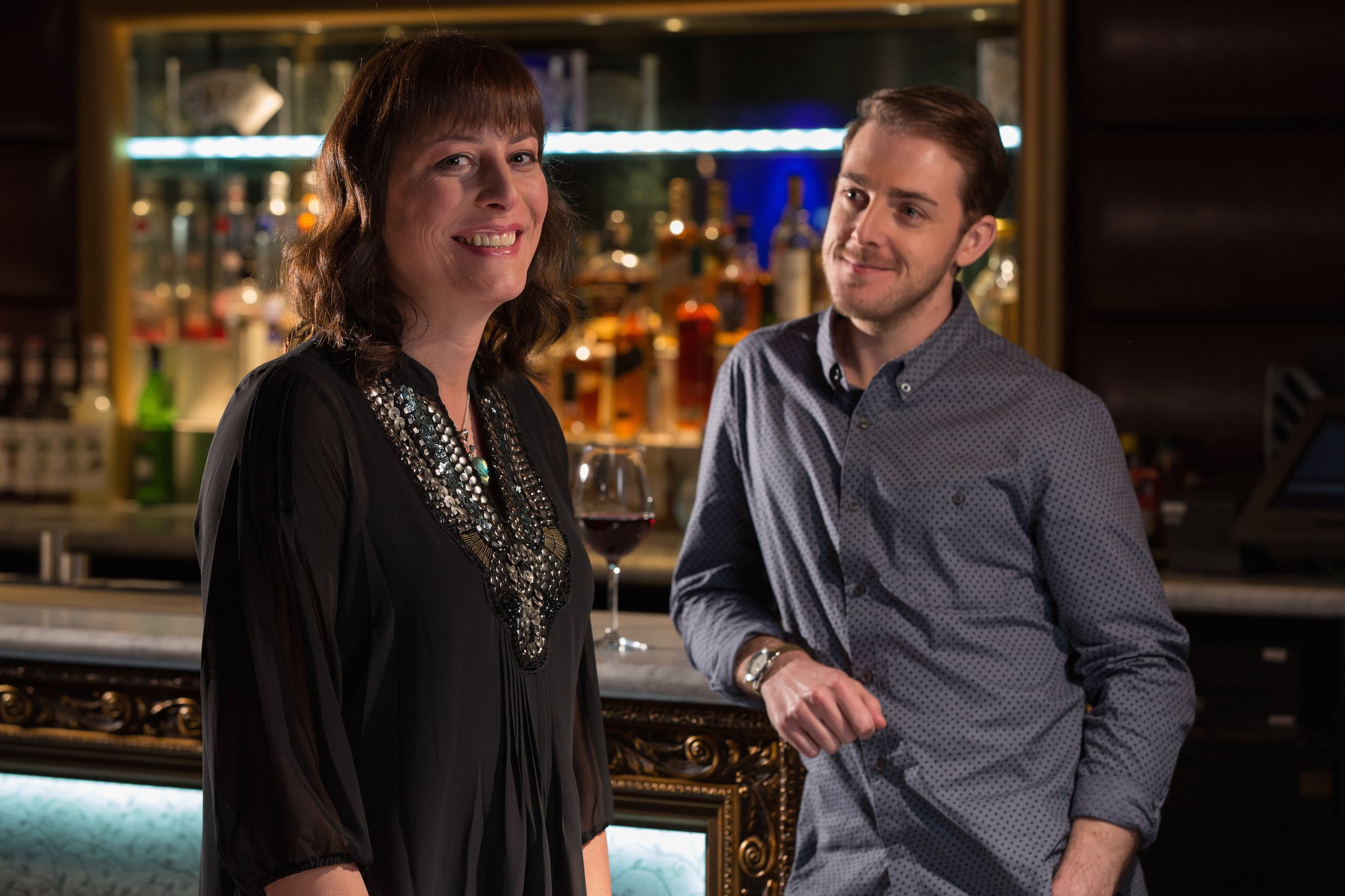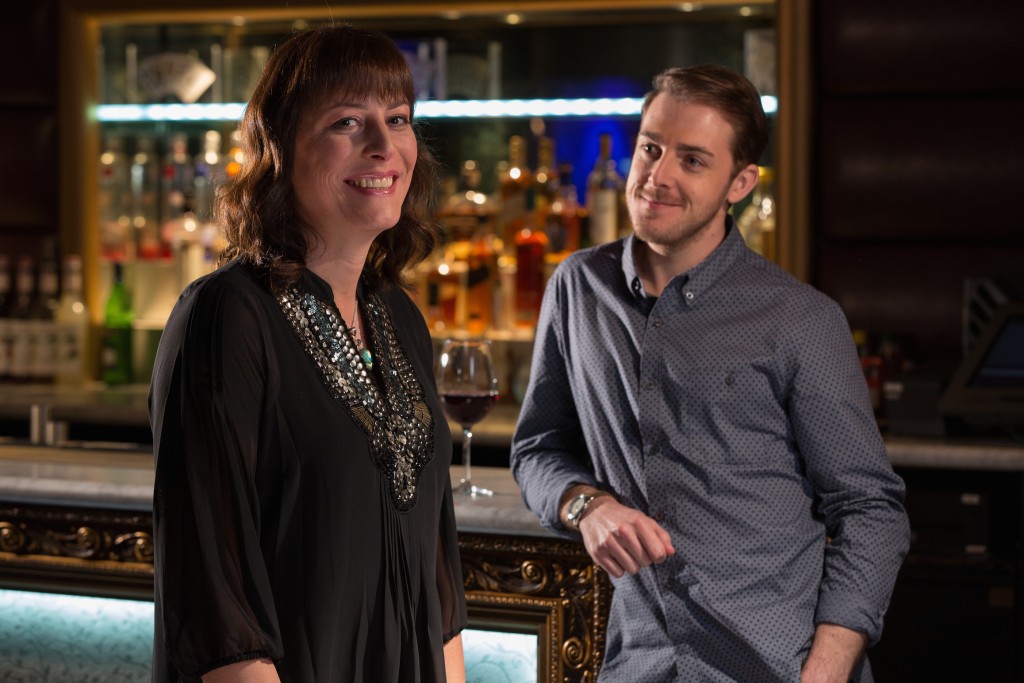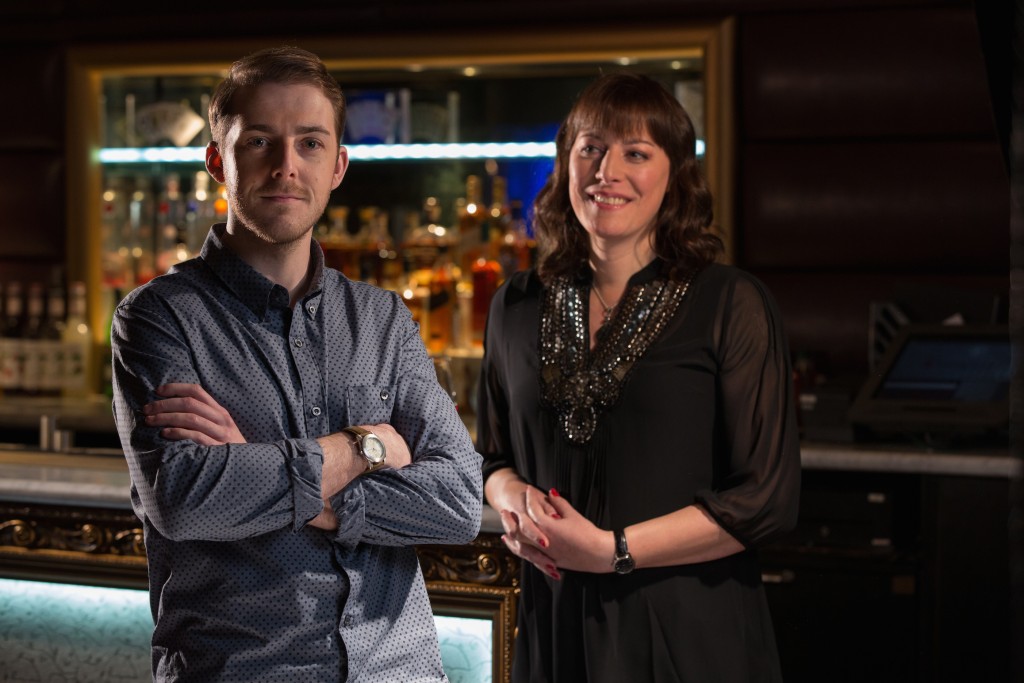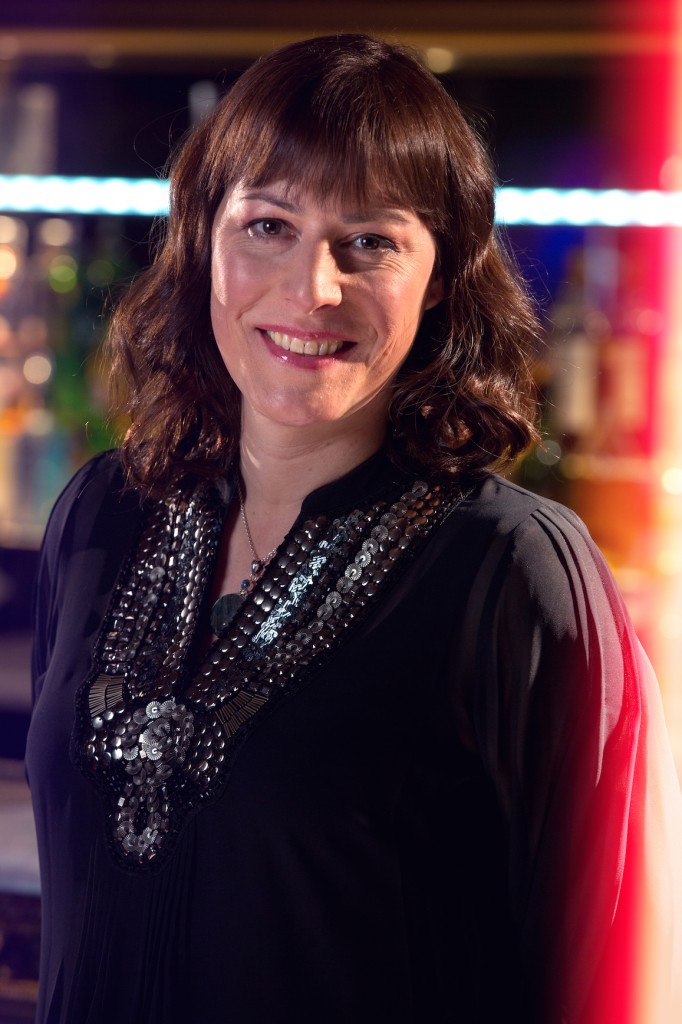Boy Meets Girl star Rebecca Root on BBC’s new trans sitcom

“It’s like being in prison all your life and not knowing your release date.”
I’m someone who has spent the majority of my adult life surrounded by LGBT people of a wide range of backgrounds. Through the gay scene and community I’ve met and befriended a number of inspirational trans people. Yet that opening sentence is the first time I’ve heard such a stark description of the very real challenge of what it feels like for a person who was born in the wrong body. The simple analogy makes the trans experience suddenly relatable, yet still unfathomably painful. And it came from a sitcom. A new British sitcom to be exact, called Boy Meets Girl that comes to BBC2 from September 3.

The words are spoken with emotive honesty by Judy, played by real life trans actor Rebecca Root, on her first date with Leo (Harry Hepple). “It’s one description, and I think it works well for Judy,” Rebecca tells me as we chat via Skype. She’s in New York observing rehearsals for a new documentary theatre piece that she will feature in at the Edinburgh Fringe called Tran Scripts, which focuses on the transgender experience.
“It’s not just being born in prison, but also being in solitary confinement,” adds Rebecca. “At least in prison there’s some sort of community, but in solitary confinement it’s a bit more limiting and even more isolating. I certainly felt very isolated growing up because in the 70s there were only glimpses and rumours of [trans] people you could associate with, you didn’t actually know anybody. It was difficult if you had something inside that you couldn’t express.
“That’s why that line really resonates, because it reminded me where I’ve come from. And that’s [Boy Meets Girl writer] Elliott’s great gift, that he’s able to encapsulate a moment like that and be truthful. That’s why I think the script is so good.” As a young boy, Rebecca says there was a certain amount of clothes and toy borrowing with her older sister that was discouraged by her parents in the way that in the 70s boys didn’t play with dolls. “I learned to conceal a lot of stuff,” she says. “You got the message that certain behavioural traits are not ‘boys’ and you suppress that. My biggest bid for freedom was when I came to London at the age of 18. All of a sudden you’re at college, you’re a ‘grown up’, and you can get away with a lot more than you can in a village in the Cotswolds. That was a great sense of liberation.”
While her family were always supportive of her transition, Rebecca acknowledges that it wasn’t necessarily always easy. “With any supportive family you find a way to cope with changing circumstances. There is a way of thinking that you need to re-evaluate one’s life and my family were brilliant with that.”
Capturing the essence of complex and highly individual trans experiences is a colossal task. Translating that into a successful sitcom format is perhaps bewilderingly gargantuan. Yet judging by the first episode that we were privy to, the tender moments are given a suitable degree of emotional gravitas when served next to the fluffier sitcom jokes. Boy Meets Girl follows in a long tradition of light entertainment TV that has often delivered the biggest shifts in social attitudes towards minorities, from what Different Strokes and Fresh Prince of Bel Air did for the black community to the influence of Will & Grace and Modern Family in terms of leading gay characters.
It may be a new acting job for Rebecca, who has worked in numerous stage and TV roles during her professional life, but this one comes with an added level of responsibility by nature of the intensely personal and groundbreaking story of the lead character being a trans person. Is there now an inevitable expectation from her community to be a role model? “To be honest with you I work with young actors anyway at E15 drama school as a voice teacher, and I would like to think I’m a role model to those students because of my ‘artistic integrity’. It’s a cheesy actor-ish phrase, but you know what I mean.

“I think when you’re a teacher you should set an example. I’m always first in the room; I’m punctual, good with time keeping with diligence to note taking and academic scrutiny. That’s my sort of teaching, because I happen to be that sort of person. So, if we translate that in to my new status, great! I welcome the opportunity because I’m not just saying I’m the only one, but I’m a voice of many. I welcome and embrace that,” she says confidently.
As the media indulges its newfound love of all things trans with Caitlyn Jenner’s new show joining the likes of Transparent and Orange is the New Black in the USA, does Rebecca mind being typecast as a ‘trans actor’ first, and ‘an actor’ second? “That’s a good question I don’t mind. The problem is so much of who you are defines the parts you play, whether it’s a physical attribute like Joe Pesci as a small, kind of dynamic underdog sort of character, or a massive Arnie kind of person. Or even an athlete or a bigger person, like Melissa McCarthy or Miranda Hart with physicality.
“Who we are kind of informs to an extent. I’m not saying it’s right to be typecast, but there is a kind of path that’s followed. I’ve played cisgender parts recently as well, and my gender identity has nothing to do whatsoever with the parts that I’m playing, so it’s possible for me to work with no reference to my gender identity. At the moment with Boy Meets Girl and Tran Scripts, yes they are trans characters. I’m trans, so it’s part of the Rebecca Root deal.”
The other main character in the ensemble that makes up Boy Meets Girl is Harry Hepple’s Leo, Judy’s romantic interest. Most readers who are part of the LGBT community will most likely have several friends that identify within that framework. However, Hepple is closer to most non-LGBT people’s direct experience of the trans community, which is a very limited one. Like his fictional character in the sitcom, he himself has been on a steep educational journey while filming the series.

“Until this job I had no experience of the trans community whatsoever,” Harry says, citing his only previous experience of dealing with anything close to trans was working with queer actor, gay rights activist and performer Bette Bourne, who is of course not trans, but more gender non-conforming. “It just hadn’t been part of my world. But doing this show and speaking to people about it, there are more and more stories. Like my aunty telling me about her boss who is in the process of transitioning from male to female, and she says how everyone in work has been so supportive.”
“Like the majority of people you are brainwashed into this focus that gender reassignment is just about an aesthetic body change, but I don’t think people take into account the emotional and psychological discovery and bravery that it takes. I don’t think I’d taken that into account until I met Rebecca and read this script. People always fixate on the biological and surgery aspects, but more fool me and shame on everyone for that, but now the media is starting to show a responsibility to show the aspects of the journey beyond that.”
Harry also highlights that what makes Boy Meets Girl go beyond a simple sitcom about a lead trans female and her new romance are the other characters and issues at play, and the focus on the “typical Newcastle family vibe” as he puts it. For a start, there’s also a bit of an age gap between Rebecca’s character and Harry’s, which proves to be the first stumbling block that Harry’s mother (played by Denise Welch) has to overcome.
“Everyone’s relationships have multiple problems and complexities. The show covers loads really well,” Harry comments. “Not just age gap and transgender, but unemployment, body image, and gender roles in parenthood. It covers those really accurately, is well-observed and hopefully really fucking funny.”
As the trans movement marches on, Rebecca is happy that a once overlooked section of society is finally being given the attention that the gay and lesbian community have been granted since the start of the Pride movement in the early 70s.
“It’s wonderful we are having our moment in the spotlight,” Rebecca smiles. “Let’s celebrate that we’re part of society.”
Boy Meets Girl screens 9:30pm Thursday September 3 on BBC Two.
This interview appears in the September Style issue of Attitude, in shops now. You can download the digital version from Pocketmags.com/Attitude or order the print copy from newsstand.co.uk/Attitude.
